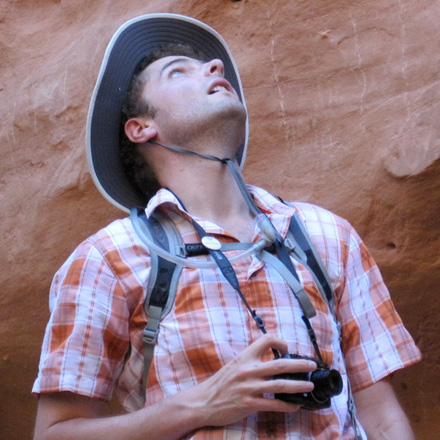 Tweet
Tweet
Featured on Jan 12, 2011
Cameron Brain
"You're doing better than you think, but not as well as you could be."
Bio:
Founder and CEO of two previous web startups. Current Co-Founder of XYDO.com.
- Title: Co-Founder
- Age: 28
- Location: West Village
- Contact: @cameronbrain
Everything on the Internet about you and your co-founder Eric states that you’re located in the Greater Salt Lake City Area, yet XYDO is based in New York. When did you make the move to New York and why did you choose this city? Also, where is your company headquartered?
We operate as a completely distributed team: two guys in the Bay Area, one in Oregon, one in Canada, three in Utah, and three in New York City. Personally, I bounce around a lot, mainly between Utah (where my partner Eric and I keep a small office) and New York. I've lived in NY state since 2002 - went to school in and ran my last startup from Troy, NY. Both Eric and I have spent a lot of time in Seattle, SF, and NYC over the years, and it's looking like we're going to end up permanently locating the company in NYC sometime this year. The scene has definitely matured over the last few years, there's clearly a lot of good talent, and we like the vibe.
The first company that you founded was a bicycle parts store, so we’re curious what you think about this fixed-gear bike trend that is going on in SF and NY. Also, are you one of the over 200K people who bike daily in NYC?
Fixed-gear is an interesting niche trend. The basis for my bike business was similar: at the time the niche trend was freeride bikes - a smaller, stouter mountain bike you could use in the city or out on the trail. The neat thing about bikes is there always seems to be a new niche trend every few years, and it's always something totally different. Maybe I'm mistaken, but it seems like tall bikes are the newest trend; used to only see them out in Portland, now they're popping up in cities on the east coast. Personally, I don't have a fixed gear; I traded up to a motorcycle a few years back. :-)
You recently wrote a blog post discussing what it’s like working with a co-founder. You close out the post by mentioning that you and Eric (your co-founder) have had some heated arguments from time to time. If possible, could you please explain how you guys go about resolving issues and how you guys go about making important company decisions?
We do get in to it from time to time, but that's just part of our dynamic. Like most entrepreneurs/founders we're super passionate about whatever it is we're debating. However and regardless of what it is we're debating, we're both focused on the same end goal: making forward progress. I'd also add that we've both been through this startup process before, a bunch of times, which helps to temper an over-obsessiveness in one's own ideas about how to do something.
Your startup, XYDO, has been in business since June and is doing a closed beta right now. How did you decide on doing a private beta?
One of the things I learned with my last few startups is that the concept of a "launch" is pretty worthless. I think especially in the consumer realm, you can get so much more by creating a little scarcity, by drawing out what would otherwise be a one-time event into an almost perpetual process. It also forces you to think about how you're going to actually make it happen (i.e., get users), rather than simply assuming that your launch will result in success (i.e., the "if-you-build-it-they-will-come" fallacy).
You founded two other companies in the past, Bicycle Parts Direct and Open Box Technologies. How did you decide when it was appropriate to make your exits from those companies?
Both were difficult decisions. I ended up selling Bicycle Parts Direct mainly b/c I was about to go to college and I didn't want to take time off or try and run it from school. It was a really fun, small business that I started based on a personal hobby (I raced mountain bikes), solved a real problem (I nor many other people could afford the good, high-priced gear), and was built exclusively through word of mouth (at races, industry events, etc.). While I was conflicted about selling, I knew the people I sold it to would continue to operate it successfully and in the same spirit as it was founded.
Open Box was a bit of a different story. It was the first company I had founded where we took outside investment. While it was a lot of fun to build, unfortunately the market we were competing in (web video) turned out to be way overhyped. In the latter half of 2008 we went out to raise our first institutional round of financing, after most of our competitors had already raised significant rounds and right when everyone was getting jittery. After it became apparent that we weren't going to be able to raise the amount we felt we needed to to grow the company, we decided to wind down the company through licensing the platform and IP to a couple of our major customers. We wrapped that up earlier last year, which was right around the time Eric and I connected and began to work on XYDO.